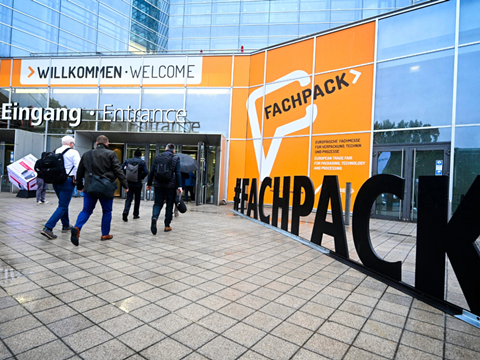
From 23rd – 25th September, Packaging Europe reported live from the show floor of this year’s Fachpack trade show at the Messezentrum Nuremberg. Established and emerging talent from every corner of the industry displayed their innovations in line with the key theme of ‘Transition in Packaging’ – a timely sentiment as industry-wide changes loom on the horizon.
Alternatives to single-use, virgin plastics were a running theme among exhibitors. Approaches ranged from reusables made from durable polymers to designed-for-recycling formats using renewable materials, as well as state-of-the-art production line technology and services for sustainability-minded packaging production.
Our content team visited numerous booths to conduct video interviews, which can be viewed in full via our rolling coverage of Fachpack 2025 or the Packaging Europe YouTube channel. Among the interviewees were Paulus Goess, who presented Mondi’s vast range of kraft, paper, and board packaging solutions; Urs Fischer, showcasing ATS Tanner’s US-2500 banding machine line; and Sandor Orban with Greif’s EcoBalance low-carbon-emission steel drum.
Other personal highlights included, but were by no means limited to, a lineup of this year’s ProCarton Awards winners, which demonstrated a powerful combination of recyclability considerations and immersive consumer experiences; and an upcoming partnership between Coveris and Nextek to convert post-consumer polyolefins into food-grade resins and films via a water-free cleaning process.
Even amidst the variation, most attendees were united in reimagining the traditional status quo – especially after the Packaging and Packaging Waste Regulation entered into force earlier this year. Opinions on the legislation and its mandates varied, yet Packaging Europe’s attendees noticed a recurring sense of uncertainty among the exhibitors we spoke to.
Some individuals shared their uncertainty about the implications of the new rules for their products and/or sectors. Others were more optimistic that the law would benefit their future output, even if there are still some creases to iron out in the legal text.
Clarity will undoubtedly emerge as the European Commission comes to further decisions – including design for recycling criteria, recyclability performance grades, derogations from minimum recycled content targets, and requirements for biobased feedstock – by its 2028 deadlines. Time will also tell how feasible the Regulation’s targets really are, but for now, the coming years are proving difficult to predict.
Our team represented five of the reported 72,000 visitors to this year’s event, and the list went beyond established packaging professionals. A Student Day held on 25th September saw young innovators bring fresh ideas to the table and make new connections; in a time of general unpredictability, it was refreshing to see upcoming talent take on our biggest challenges.
On a different note, rumours were circulating on the ground that some of the big names in the packaging space don’t plan on attending Interpack 2026 in Düsseldorf. Business strategist and consultant Yair Gellis identifies a rapid decline in trade show attendance in general following the COVID-19 pandemic, and considers whether digital exposure has become the new norm – or whether trade shows in Asia are gaining popularity over their European counterparts.
Whether or not the hearsay is true, there is no question about Packaging Europe reporting live from the scene, and we are already making travel plans. We are eager to hear from any and all innovators, whether they are international conglomerates or newly-established start-ups. Everyone’s input is important in the broader pursuit of more sustainable packaging, as Fachpack 2025 clearly demonstrated – and as we hope our Sustainable Packaging Summit in Utrecht will further emphasize from 10th – 12th November 2025.
If you liked this story, you might also enjoy:
The ultimate guide to the Packaging and Packaging Waste Regulation in 2025
How are the top brands progressing on packaging sustainability?
Everything you need to know about global packaging sustainability regulation in 2025
The key to increasing the use of reusable packaging in supermarkets


















No comments yet